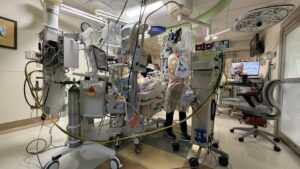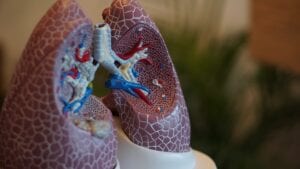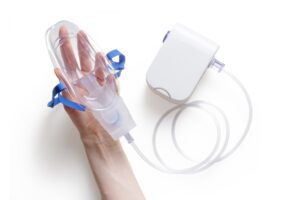Cystic Fibrosis (CF)
What is CF?
Cystic fibrosis (CF) is a genetic condition that causes progressive respiratory and digestive system damage. Someone with CF has thick, sticky mucus, versus “healthy” slippery mucus, which builds up in their system. That build-up can clog airways, trapping bacteria, leading to breathing problems, frequent infections, lung damage and respiratory failure. Additionally, the thick mucus prevents the release of digestive enzymes, making it difficult for patients to absorb necessary nutrients.
Cystic fibrosis typically occurs in one in 2,500- 3,500 Caucasian newborns in the US. In other ethnicities, it is even more rare, occurring in one in 17,000 and one in 31,000 African Americans and Asian Americans respectively.
What are the symptoms of CF?
Cystic fibrosis symptoms typically manifest in the respiratory and digestive systems. Those symptoms include:
- Persistent coughing and wheezing
- Shortness of breath
- Difficulty exercising
- Frequent lung infections
- Stuffy nose
- Difficulty gaining weight
- Constipation
- Salty-tasting skin
- Male infertility
- Exercise intolerance
What causes CF?
Cystic fibrosis is a recessive, genetic disorder, meaning both parents have to carry at least one copy of the defective gene for the child to inherit it. The genetic mutation affects the protein that regulates salt movement. This results in respiratory, digestive and reproductive issues. The genetic mutation also varies in severity.
How is CF diagnosed?
Cystic fibrosis is usually diagnosed at birth as newborn screening in the US is standard. Screening newborns for CF includes the following tests:
- Blood sampling for high levels of immunoreactive trypsinogen (IRT)
- Genetic testing for specific defects in the gene that causes CF
- Sweat tests, conducted at two weeks old, for saltier than normal sweat
What are the treatments for CF?
Cystic fibrosis treatment aims to prevent or control infections, removing mucus from the lungs, preventing intestinal blockage and providing nutrition. CF treatment includes:
- Antibiotics
- Anti-inflammatory medications
- Meds that help cough up mucus
- Bronchodilators
- Pancreatic enzymes and devices to help add these back in
- Exercise therapy
- Chest physical therapy
- Vest therapy
- Vertex’s “triple combo treatment” option, coming soon!
- Surgery to:
- Remove bowel blockages
- Remove nasal polyps
- Replace lungs (lung transplant)
- Place a feeding tube
Where can I find out more about CF?
Cystic Fibrosis (CF) Articles

Nick and Rene’s Caregiver Story for Their Daughter with Cystic Fibrosis

Boy Battling Cystic Fibrosis Finds Role Model in FSU Seminoles Outfielder


Atlanta Braves’ Ronald Acuña Jr. Plays Catch with Fan Living with Cystic Fibrosis (CF)

March 23: Lee University to Host the 2024 65 Roses 5K for Cystic Fibrosis (CF) Awareness

Cystic Fibrosis Foundation to Host 8th Annual BreatheCon on February 9-10, 2024

Orphan Drug Designation Granted to ARCT-032 for Cystic Fibrosis



